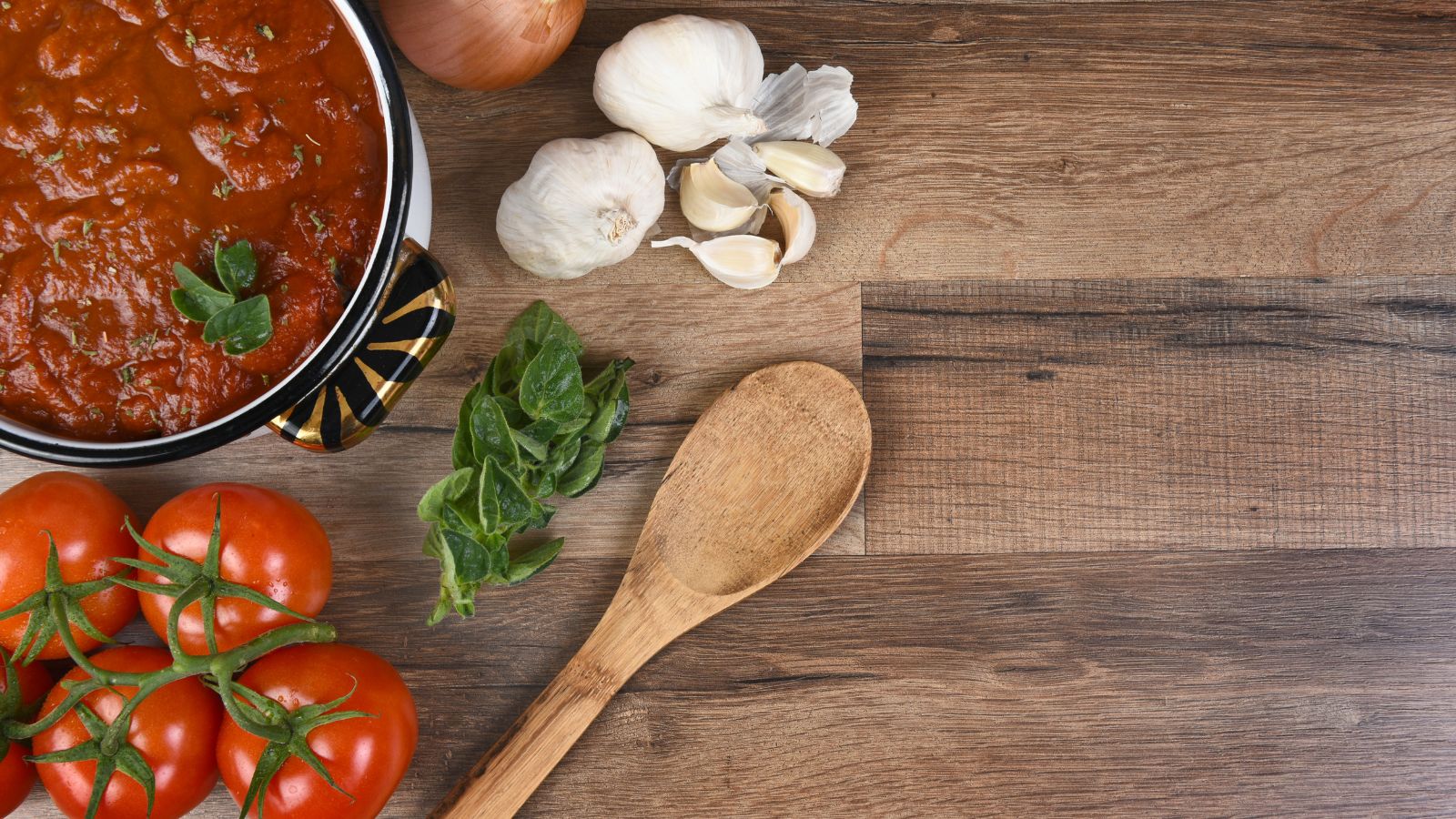
Is Tomato Sauce Gluten Free? How to Choose the Right One
Photo Credit: Canva Pro
You might be wondering, is tomato sauce gluten free? Is it safe to eat if you are trying to stay away from gluten? Some tomato sauces don't contain gluten. It's possible that some sauces contain gluten or could be contaminated with other foods.
How to read labels, which brands are safe, and which sauces to stay away from are all explained in this article. Also, simple answers to frequently asked questions about tomatoes, ketchup, and sauces.
Is tomato sauce gluten free?
Photo Credit: Canva Pro
Is tomato sauce gluten free? Though tomato sauce is usually thought of as a simple and safe food to keep in the pantry, gluten-free people should know what's in the jar.
Luckily, most simple tomato sauces don't contain gluten by nature. Nevertheless, not all pasta sauces are safe because they might contain gluten-containing ingredients that are not obvious or might be contaminated during production.
Understanding What "Gluten-Free" Really Means
Certain grains, like wheat, barley, and rye, contain a protein called gluten. Gluten intolerance or celiac disease can have serious problems. Some tomato sauces may not contain gluten ingredients, but without a gluten-free label or certification, there's a risk of cross-contamination that can pose health risks for those with celiac disease.
-
Gluten-free standard: Contains less than 20 parts per million of gluten.
-
Naturally gluten free: Extra virgin olive oil, fresh herbs like basil, and fresh tomatoes.
-
Hidden risks: Ingredients like thickeners, wheat flour, or using shared tools can make a sauce unsafe.
Tomato Sauce Ingredients: The Safe and the Risky
Olive oil, minced garlic, and canned tomatoes should be the main ingredients in a basic tomato sauce. There are, however, many store-bought options that contain gluten-containing flavorings or preservatives.
-
Safe options: Products that don't contain gluten include garlic, onions, crushed tomatoes, and fresh basil.
-
Risky additions: Gluten-containing ingredients, like wheat flour or starches.
-
Best practice: For full control, buy a labeled gluten-free tomato sauce or make your own.
What sauces are not gluten-free?
Photo Credit: Canva Pro
For people who don't eat gluten, not all sauces are safe. Some use ingredients that contain gluten to make things thicker or to add flavor. If you know which sauces to stay away from, you can protect your health and keep your stomach from hurting.
Common Sauces That Usually Contain Gluten
If you buy sauces in stores, a lot of them are made with wheat gluten or in places that use gluten. Before you buy, always read the labels.
-
Often not gluten-free: Two kinds of sauces: soy and hoisin.
-
Salad dressings: As stabilizers, you can use malt vinegar or wheat flour.
-
Gravy and cheese sauces: Gravy and some cheese sauces may be thickened with wheat flour, though gluten-free thickening agents like cornstarch are also common—check labels to confirm.
Why “Natural Flavors” and Thickeners Can Be a Trap
Some pasta sauce brands have flavorings or spices that aren't very clear and may come from gluten-containing foods. It's hard to know what's safe without clear labels.
-
Watch out for: Modified food starch, malt extract, or caramel coloring.
-
Read carefully: Look for items that say "gluten free" right on the label.
-
Safer bet: You can make your own gluten-free pasta sauce at home or buy sauces from brands you know and trust.
Does ketchup have gluten?
Photo Credit: Canva Pro
Many people keep ketchup in their kitchens and use it in recipes or as a dip. Before putting it on your gluten-free shopping list, there are a few things you should know.
What’s in Standard Ketchup (and What’s Not)
Garlic, vinegar, and sugar are some of the gluten-free ingredients that are used in most ketchup brands. These are safe for people who don't eat gluten.
-
Typical ingredients: Sauce made with tomato paste, sugar, vinegar, and spices.
-
Naturally gluten free: Vinegar and tomatoes that have been properly distilled.
-
Brand check: Be sure to find ketchup that says it is gluten-free.
When Ketchup Might Not Be Safe
Even if ketchup doesn't have gluten in it, it may have been made in the same factories that make foods that do have gluten.
-
Hidden sources: Barley or wheat-based vinegar or thickening agents may be present and should be avoided.
-
Label matters: Pick brands that are known to be gluten-free or have been approved by the gluten-free community.
-
Safer picks: Some ketchup brands, like ones in Fully Healthy, label their products as gluten-free.
Are all tomatoes gluten-free?
Photo Credit: Canva Pro
People on a gluten-free diet can eat tomatoes in their natural state. As a result, they don't contain any glutinous ingredients. But then again, is tomato sauce gluten free? Some products, like tomato sauce and tomato paste, are more likely to contain gluten when tomatoes are processed. Reading labels is important to find gluten that isn't obvious, especially when buying store bought sauce.
Raw Tomatoes: Naturally Gluten-Free
You can make homemade sauces and cook with fresh tomatoes. They give things a fresh taste without using gluten.
-
Safe to eat: Fresh parsley, herbs, and raw tomatoes.
-
Naturally gluten free: Fire-roasted tomatoes, cherry tomatoes, and whole tomatoes.
-
Good for: Making homemade gluten-free spaghetti sauce or marinara sauce gluten-free.
Packaged Tomato Products: A Word of Caution
The tomato paste and canned tomatoes are used in lots of sauces. They are usually thought to be gluten-free, but cross-contact during processing is a problem. Some foods contain gluten-containing ingredients like wheat flour or seasonings.
-
Check the label: Choose tomato paste that is labeled gluten-free or certified gluten-free to ensure safety.
-
Avoid: Products that contain wheat flour, modified starch, or vaguely defined "seasonings."
-
Safer picks: Trustworthy brands of pasta sauce that say on the label that they are gluten-free or products that are certified organic.
Is Fully Healthy a good source for gluten-free foods?
Fully Healthy markets gluten-free products, though shoppers should still verify third-party gluten-free certifications on individual products, such as dairy-free goods, gluten-free pasta sauces, and sauces made without gluten ingredients. It's great for people who have celiac disease or try to stay away from gluten.
What Makes Fully Healthy (ShopAIP) Unique?
There are a lot of different kinds of specialty foods on this site, such as gluten-free sauce, certified organic tomato products, and sauce that is gluten-free by design.
-
Highlights: Food can be made without dairy, gluten, or tomato basil sauces.
-
Specialty lines: Includes delicate recipe versions that don't use onions or garlic.
-
Focused on: Helping people stay away from gluten and other allergens.
A Reliable Marketplace for Specialty Diets
When you need to buy safe and correctly labeled products, like buying spaghetti sauce gluten free or fire roasted vegetable sauce, Fully Healthy can help you.
-
Gluten-free pasta sauces: It has pizza sauce, marinara sauce, and spicy marinara.
-
All products: Picked with care to meet the needs of gluten-free diets.
-
Easy shopping: Filters let people sort by certified gluten-free or dairy-free.
Final Thoughts
Is tomato sauce gluten free? Choosing the right tomato sauce helps keep your gluten-free diet safe. Always read labels and avoid wheat flour or gluten-containing foods. Prevent cross-contamination when using ground beef in marinara sauce or making your own sauce with garlic, red pepper, and Italian seasonings. Store leftovers in an airtight container and reheat on low, stirring occasionally.
Stick with trusted gluten-free products and your favorite brand. Pasta, tomatoes, and sauce are fine if you're careful. Check labels on sauces with added sugar or extra thickness. Always double-check, even with ready-made products.
FAQs
Is ground beef gluten free in sauce?
Yes, ground beef is naturally gluten free, but always double check for wheat flour or sauces with gluten.
Can I eat marinara sauce on a gluten free diet?
Yes, marinara sauce is generally gluten-free if it does not contain wheat flour or thickeners. While sugar and black pepper do not contain gluten, additives, or cross-contact risks should be checked on the label.
How do I prevent cross contamination in pasta?
Cook pasta separately, use a clean airtight container, and avoid stirring occasionally with shared spoons.
Are italian seasonings and red pepper gluten free?
Yes, Italian seasonings, red pepper, garlic, and black pepper are gluten-free, but double-check labels to prevent cross-contamination.
Can I use any favorite brand of sauce?
Only if it’s labeled gluten-free. Some sauce may be extra thick or have sugar added—always read and store in an airtight container.

Leave a comment